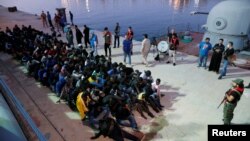The prosecutor at the International Criminal Court warned Wednesday that the situation in Libya “remains dire” and promised to seek new arrest warrants if serious crimes don’t stop.
Fatou Bensouda also demanded the arrest and transfer of suspects already subject to arrest warrants, including the son of former Libyan dictator Moammar Gadhafi, the former head of Libya’s Internal Security Agency and a Libyan military officer alleged to have been involved in the killing of 33 captives “in cold blood.”
Bensouda told the U.N. Security Council that the security situation in Libya “remains unstable with violent clashes occurring between various factions across Libya.” Widespread violations of human rights and international humanitarian law by different parties to the conflict also have been reported, she said.
Arrests, torture, killings
Bensouda pointed to reports emerging that the bodies of 36 men were found in the town of al-Abyar, 50 kilometers (30 miles) east of Benghazi.
“The bodies were reportedly handcuffed, showed signs of torture, and displayed bullet wounds to the head,” she said.
Bensouda also cited information that the Libyan National Army commanded by Gen. Khalifa Hifter has allegedly intensified restrictions on access to the city of Derna in recent months, blocking medicine and fuel from entering because of fighting with the Derna Mujahideen Shura Council.
She said hundreds of residents attempting to leave the city had been arrested, and she condemned airstrikes on a residential neighborhood that reportedly killed civilians, including 12 women and children.
Chaos in Libya
The overthrow of Gadhafi in 2011 spawned chaos in Libya. The power and security vacuum left the country a breeding ground for militias and militants including the Islamic State extremist group and al-Qaida affiliates. It has also made Libya a gateway for thousands of migrants from Africa and elsewhere seeking to cross the Mediterranean to Italy.
Since 2014, Libya has been split between rival governments and parliaments based in the western and eastern regions, each backed by different militias and tribes. A U.N.-brokered deal in December 2015 to create a unity government failed, though talks have been taking place to form an administration to lead the country ahead of elections.
Bensouda told the council she is gravely concerned at reports of unlawful killings, including the execution of detained people, kidnappings and forced disappearances, torture, prolonged detention without trial, rape “and other ill-treatment of migrants in official and unofficial detention centers.”
She expressed concern at crimes against migrants transiting through Libya and said “such crimes may fall within the jurisdiction of the court.”
“Let me be clear: If serious crimes ... continue to be committed in Libya, I will not hesitate to bring new applications for warrants of arrest,” Bensouda said.
Arrest warrants
As for Libyans already the subject of arrest warrants, Bensouda said her office is trying to confirm the current whereabouts of Seif al-Islam Gadhafi, the late dictator’s son, who is charged in an ICC arrest warrant with murder and persecution for his alleged role in the violent suppression of anti-government protests in 2011.
He was released from custody in June after more than five years in detention as part of a pardon issued by the Libyan parliament based in the country’s eastern region.
The ICC prosecutor also urged that Hifter transfer to the court without delay Mahmoud al-Werfalli, a Libyan military officer suspected of being behind a string of killings earlier this year in the city of Benghazi, including the killing of the 33 captives. Bensouda noted that Hifter “has publicly expressed gratitude for the work of the court in relation to Mr. al-Werfalli’s case.”
She said her office is also trying to locate Al-Tuhamy Mohamed Khaled, who is wanted for four crimes against humanity and three war crimes, including torture, persecution, cruel treatment and outrages upon personal dignity. The charges involve prisoners held by Libyan security forces during protests against Gadhafi’s regime in 2011.




